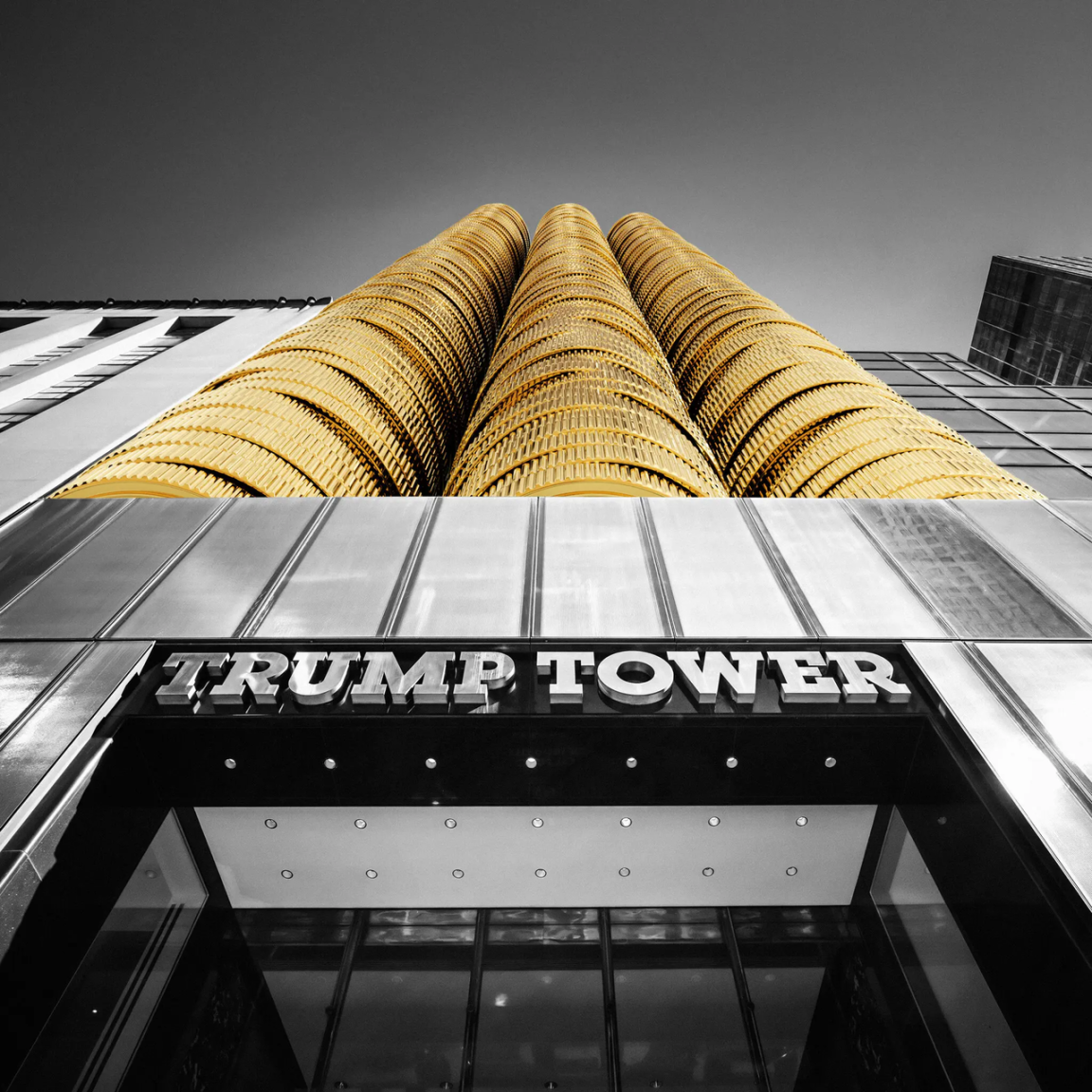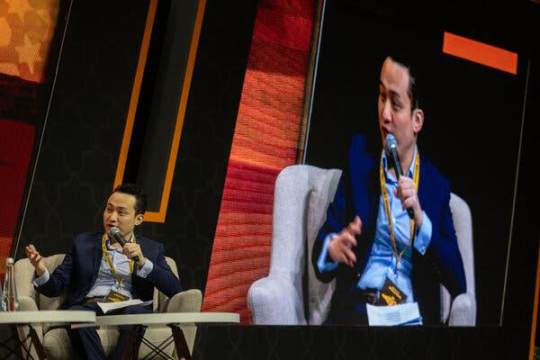Trump's "Golden Book" Strategy: The Political Abacus Behind Cryptocurrencies

転載元: panewslab
05/03/2025·16DOriginal title: "Secret Deals, Foreign Investments, Presidential Policy Changes: The Rise of Trump's Crypto Firm"
Written by: Eric Lipton, David Yaffe-Bellany, Ben Protess, The New York Times
Compiled: J1N, Techub News
A few days before President Trump's inauguration, the promotion of "ZMoney" appeared on the encrypted messaging app Signal.
"ZMoney" refers to Zachary Folkman, an entrepreneur who once runs a company called Date Hotter Girls, and currently serves as the representative of WLFI. Zachary Folkman was writing a letter to a cryptocurrency startup in the Cayman Islands, proposing a "partnership" where both parties will buy each other's digital currency, a deal that will enhance the startup's public image.
But the New York Times found that there was a hidden clause. To gain the privilege of working with the Trump family, the startup actually had to pay millions of dollars secretly to WLFI.
"Everything we do has received a lot of exposure and credibility," Zachary Folkman wrote, claiming that other business partners have committed to donating between $10 million and $30 million to WLFI.
WLFI executives said the Cayman Islands startup rejected the proposal, and several other companies that received similar invitations from WLFI have also declined it. They believe the deal is immoral, believe that WLFI is essentially selling traffic from its political endorsement, and concealing it from the public.
WLFI executives insisted that they did not do any wrongdoing, and their actions were not hindered. They successfully marketed similar deals to other companies, while also selling WLFI tokens to buyers around the world, eventually garnering more than $550 million in sales, with a large portion of the proceeds distributed to the president’s family.
Trump’s return to the White House has opened up new avenues for him to use his power to make huge profits, whether through his social media companies or new overseas real estate deals. But the Trump family's other business activities have far less conflicting interests and power than the series of related transactions brought about by creating WLFI.
Mainly held by the Trump family business entity, WLFI breaks the norms of the president by centuries-old society, eliminating the boundaries between private business and government policies in ways unprecedented in modern American history.
Trump is now not only a major cryptocurrency trader, but also the industry's top policymaker. So far, during his second term, Trump has used his presidential powers to benefit the industry. Although he has been mocking cryptocurrencies for years as a safe haven for drug dealers and scammers, he keeps getting his company through cryptocurrencies.
Members of the Trump administration team included sympathizers for the cryptocurrency cause, including the appointment of a cryptocurrency industry adviser to the U.S. Securities and Exchange Commission (SEC). In addition, the Justice Department recently disbanded a cryptocurrency crime task force, continuing to fully relax the industry’s scrutiny in the Biden era.
The New York Times investigated WLFI’s rapid rise from startups to an international force and Trump’s transition from cryptocurrency skeptic to industry staunch supporters, highlighting a range of conflicts of interest in the company:
WLFI benefited directly from Trump’s administration actions, such as his announcement of the establishment of a federal cryptocurrency reserve that includes digital currencies invested by WLFI. The president's statement caused temporary increase in the value of assets held by WLFI.
According to interviews and data obtained by The New York Times, WLFI has sold its cryptocurrency to overseas investors, including Israel and Hong Kong, opening up a new way for foreign companies to please Trump.
Several investors in WLFI's cryptocurrency management company have been accused of misconduct by the federal government. Among them is an executive whose alleged fraud case was suspended after investing millions of dollars in WLFI. Other investors and business partners are looking for business expansion, which requires approval from the Trump administration.
WLFI proposes cryptocurrency transactions with at least five startups and often demands high compensation in Trump’s name. These deals have attracted the vigilance of senior executives.
"This is a stain on our industry, and anyone who accepts the project will obviously think they will make money because it is an officially recognized project by Trump."
WLFI spokesman David Wachsman denied that any transactions from the company constituted "unilateral service payments." But he admitted that the company did participate in the "co-investment deals" and said the deals led to "a well-thought-out strategic exchange between the two parties, mutually beneficial."
David Wachsman also said that it was "false, absurd and dangerous" to consider investment or cooperation with WLFI as some kind of political exchange. "No investor or partner has ever asked for any political favoritism, and we will never consider this possibility," he said.
Still, the deal reached by WLFI benefited the president and his family. According to the WLFI website, a commercial entity owns 60% of WLFI shares and is entitled to 75% of the revenue from the token sale, which can be converted into cash.
"This is one of the most successful things we have ever done," said Eric Frederick Trump, son of the president in charge of the family business, in an interview at Trump Dora Golf Course in Florida this month.
He and his older brother Donald John Trump are actively involved in WLFI, although they rely on three partners to oversee the day-to-day operations of the project. Two of them, Zachary Folkman and Chase Herro, have mixed records in the cryptocurrency space. The other is Zach Witkoff, the son of Steve Witkoff, the U.S. envoy to the Middle East on Trump’s team and one of the founders of WLFI.
In recent days, Zach Witkoff, Zachary Folkman and Chase Herro met with Prime Minister Muhammad Shehbaz Sharif in Pakistan, as well as other senior government officials, to discuss the WLFI project. The itinerary was arranged with limousines, dance performances and police car escorts, perfectly blending the president's business interests with the formality of state visits.
President Trump pointed out that the conflict of interest law does not apply to him and that he enjoys extensive immunity for the official actions he has taken as the president.
A spokesman for President Trump pointed out in a statement that his “assets are managed by trust funds managed by his children” and therefore “no conflict of interest”.
WLFI supporters are not concerned about the conflict. "Trump wants to make a lot of money in the cryptocurrency space," said Konstantin Kuznetsov, a Russian citizen living in Miami. His company is based in Gibraltar and bought $1 million worth of World Liberty cryptocurrency. "We can join this wave."

Chief Cryptocurrency Advocate
As a businessman who has become famous in the real estate sector, Trump has never aspired to build a digital currency empire. In fact, at the end of his first term, Trump expressed his contempt for cryptocurrencies through social media. They are "not money", he warned. Their value is "extremely unstable and unfounded". By last year, his views began to change.
His eldest sons have become ardent supporters of cryptocurrencies after the Capitol was attacked and family businesses were expelled from the mainstream financial system on January 6, 2021.
"We build, sell and hold real estate permanently. For a long time, I could reach everyone in the world," Donald John Trump explained via live video at a cryptocurrency conference in Washington last month. "Suddenly, it became very difficult. I quickly realized how serious discrimination exists in the general financial market."
Meanwhile, millions of dollars in campaign donations from the cryptocurrency industry have also poured into Trump's re-election campaign. During the Biden administration, the cryptocurrency industry faced nearly 100 enforcement actions by the Securities and Exchange Commission (SEC), and executives of the cryptocurrency industry hope to find a leader in Washington who can safeguard its interests.
Trump’s doubts about cryptocurrencies seem to have disappeared during the campaign. At a Bitcoin conference in July, he vowed to build the United States into the "global cryptocurrency capital."
Two months later, Trump completed a conceptual change, announcing that he and his son would enter the cryptocurrency market by establishing World Liberty Financial.
Trump announced the news through a live broadcast at Mar-a-Lago in Florida, where he and Eric Frederick Trump, Donald John Trump, Zachary Folkman, Chase Herro, Zach Witkoff were also gathered. "Cryptocurrency is one of the things we have to do," Trump said. "I have to do it whether we like it or not." It is rare to choose Chase Herro and Zach Witkoff as the president's partners.
Zachary Folkman, with short curly hair and tattoos, ran a company in her 20s, providing guidance for down-and-out men to pick up women. On multiple podcasts, Chase Herro tells the redemption path of his life, describing his wild youthful years, who was charged with possession of marijuana and spent several weeks in a prison in Wisconsin.
The two have worked together for many years, selling a variety of goods, from colon cleaners to quick get-rich advice, and later turned to cryptocurrencies, but the results are not consistent.
In 2022, Chase Herro encouraged crypto enthusiasts to invest in TerraUSD, calling it "one of the coolest assets in history." One month later, TerraUSD collapsed and billions of dollars of wealth disappeared. Chase Herro’s recent cryptocurrency platform with Zachary Folkman is Dough Finance, which was hacked in July, resulting in $2 million stolen.
It is unclear how the two won the trust of the Trump family. But Steve Witkoff said last year that he met them through his son and introduced them to the Trump family.
In a live broadcast introducing the World Freedom Organization, Donald John Trump praised these people as top-notch financial talents.
"You can put them in Goldman Sachs' conference room and they will make everyone in the room amazed," he said.
In October, Chase Herro and Zachary Folkman began their first plan to sell WLFI tokens with a targeted sales of $300 million.
WLFI is different from MemecoinTRUMP, at least according to its marketing publicity, anyone who buys WLFI tokens can vote on business decisions like shareholders of traditional companies. The final plan is to operate as a new type of Internet banking, allowing customers to borrow in various digital currencies.
Trump is the core of this publicity. The company released a 13-page "Golden Book" describing its mission and leadership team. On the cover is a portrait of Trump, designed as if he was splashed with gold paint.
The newspaper said he will serve as the company's "principal cryptocurrency advocate."
When the WLFI program was launched, the Trump family and its affiliates received 22.5 billion WLFIs, with a paper value of at least $1.1 billion so far.
Under the company's rules, the Trump family and other WLFI investors are not allowed to sell their coins on the open market, but the company said it could eventually lift the restrictions if other token holders agree.
Initially, there were very few buyers. By the end of October last year, WLFI sold only $2.7 million worth of coins, a far cry from its target.
Election Day changed the situation.
A large number of investors flocked
With the votes over most of the U.S. and Trump is about to win, the WLFI account on X posted a celebration message on November 5: "The big thing is about to happen."
Soon, a large amount of investment poured into World Liberty's cryptocurrency.
Most cryptocurrency transactions are recorded on public ledgers called Blockchain, with buyers and sellers basically anonymous. But World Liberty said it conducted a comprehensive review of investors in its cryptocurrency and therefore knew who they were.
On-chain data analytics company Nansen, an analysis for the Times based on cryptocurrency industry data, shows that many investors live in overseas regions such as Singapore, South Korea, Hong Kong and the United Arab Emirates.
Federal law prohibits foreigners from donating to presidential campaigns or inauguration funds, but the sale of WLFI offers a new, legal way to support Trump.
"The main reason for buying this token is to support Trump's inauguration, as he is the first crypto-friendly president in the United States," said Keer Lau, chief strategy officer at Orbiter Finance in Hong Kong.
Some domestic and foreign investors manage companies that violate U.S. regulations. One of them is Israeli Yoni Assia, who founded the online trading platform eToro, whose U.S. subsidiary reached a $1.5 million settlement with the Securities and Exchange Commission (SEC) last year for crypto-related violations. Puerto Rican investor Troy Murray also bought World Liberty's cryptocurrency. Prior to that, he helped create BarnBridge, which agreed to pay $1.7 million to the SEC at the end of 2023 to settle its own cryptocurrency-related allegations.
Since Trump took office, some World Liberty investors have been urging the government to get regulatory approval or be prepared to interact with the government as they try to build or expand their business in the United States.
In March this year, Asia's company notified the U.S. Securities and Exchange Commission (SEC) that it plans to go public in the United States. UAE-based cryptocurrency company DWF Labs announced this month that it has spent $25 million to acquire WLFI and will open an office in New York.
"This deal has increased our visibility in the United States. We want to have a direct conversation with policy makers," Andrei Grachev, managing partner at DWF Labs, said in an interview.

At the end of last year, Justin Sun bought a banana tape-touched to the wall at an art auction for $620,000, which attracted global attention. Soon after, Masayoshi Son made another eye-catching move: he spent $75 million to buy WLFI tokens.
The investment has attracted widespread criticism from the community because Justin Sun clearly intends to please the Trump administration. During Biden's administration, the U.S. Securities and Exchange Commission sued Justin Sun, claiming he fraudulently raised the price of Tron TRX.
Justin Sun denied the SEC allegations and said in a text message to the New York Times last year that his investment in WLFI is just a vote of confidence in the Trump family's "excellent projects."
At the end of February, the SEC asked a federal judge to suspend the trial of Justin Sun's case: The agency said it was exploring "potential solutions." The judge approved the request.
Stars sing together
Justin Sun provided great support to the World Freedom Organization. But Trump's company wants more money. More.
So, World Liberty executives quickly announced what they called a “transformative initiative” to work with and invest in cryptocurrencies in other cryptocurrencies. Executives said in February that the strategy will leverage World Liberty’s growing presence to help lesser-known partners.
"It's like taking care of your brother in space," Chase Herro said at a cryptocurrency event in New York that month.
But World Liberty’s public statement overlooks a key aspect of its private pitch to several cryptocurrency startups, according to executives at several cryptocurrency startups. World Liberty wants to sell its own cryptocurrency, not just investing in other cryptocurrencies. It proposes currency swaps.
According to executives of three cryptocurrency companies the company approached, the deals proposed by World Liberty are as follows: The startups will spend $10 million to $30 million to buy a large amount of World Liberty’s cryptocurrency. In return, World Liberty will buy a small amount of owned cryptocurrency for each startup. The remaining funds will be owned by World Liberty – with a premium of up to 20%.
The World Liberty acquisition will send a signal to the market: Trump’s company believes these startups are worth investing in. But the market cannot know whether World Liberty was paid for this endorsement. Industry news media Blockworks has previously reported some details of World Liberty's similar publicity.
"They kept telling us that we felt we were very close to Trump," said Mike Silagadze, CEO of Ether.Fi, a cryptocurrency startup that World Liberty has approached.
"We immediately refused," said Dominik Schiener, founder of the Berlin-based IOTA Foundation. The foundation also received the proposal and said "it's a very dishonest approach."

Dominik Schiener, Founder of IOTA Foundation
World Freedom Organisation spokesman Waxman said in a statement that the New York Times report “has fundamental misunderstandings about industry standard practices” and said the company’s business arrangements “not only are common in the blockchain industry, but are crucial to building lasting economic alliances in the business world.”
"These arrangements have established interest for all parties," he added.
The Times found that the benefits of the collaboration were enough to attract at least five cryptocurrency companies to enter into other deals with World Liberty, but without the need to disclose details of the financial arrangements.
In a deal, the U.S.-based Sui Foundation announced that World Liberty would buy its unspecified amount of cryptocurrency, which caused Sui's price to rise by more than 10%. The foundation will receive World Liberty’s cryptocurrency in return as part of the agreement, two people familiar with the matter said. Two people familiar with the matter asked to be anonymous due to private negotiations.
Other collaborations by the World Freedom Foundation also show how Trump integrates his public office with business activities. Last December, the company announced it would use technology designed by Lisbon startup Ethena Labs. The company also purchased more than $5 million worth of Ethena cryptocurrency.
One of Ethena's investors is cryptocurrency entrepreneur Arthur Hayes, who pleaded guilty to violating the Bank Secrecy Act in 2022 and was sentenced to six months at home jail. Last month, Trump pardoned Arthur Hayes. (A spokesperson for Ethena and Hayes declined to comment.)
Another partner of World Liberty is Ondo Finance, a New York-based startup invested by Founders Fund, a venture capital firm of conservative billionaire Peter Thiel.
World Liberty first purchased Ondo tokens in December, with purchases of more than 130,000. The deal pushed up the price of Ondo tokens for at least a short time and became the headlines of major cryptocurrency news sites, praising World Liberty’s bet.
In January, Ondo donated $1 million to Trump’s inauguration, securing an invitation to attend a candlelight dinner at the National Museum of Architecture in Washington, with several nominees on the guest list of Trump’s cabinet. Ondo also sponsored an inauguration event called "Crypto Ball". Not long after, Donald John Trump and World Liberty's management team became headlines for a meeting organized in New York.
"We weren't sure if this moment would happen," Ondo Chief Strategy Officer Ian De Bode said on stage. "But sometimes, things just happen."
"Thank you again in the future"
In February, Eric Trump conveyed some investment advice to his fans on X: "In my opinion, now is a good time to buy Ethereum."
This is the stock code of a digital currency called "Ethereum". "Thank me again," he added, and deleted the sentence.
His advice proved to be very prescient.
The following month, Trump announced the establishment of the "U.S. Cryptocurrency Reserve Center", a cryptocurrency repository similar to that of Fort Knox, aiming to help support the industry.
Trump's statement listed a list of digital currencies that will be included in the reserves. In addition to Bitcoin, he also included Ethereum and said it would "become the core of the reserve."
Ethereum prices soared more than 13%.
World Liberty is directly benefiting from this surge. According to crypto data company Arkham, the company has purchased $240 million worth of Ethereum in the past few months.
The day the president announced his cryptocurrency reserves, assuming World Liberty did not sell any holdings of Ethereum, its value rose by $33 million. But as Ethereum's value declined, this part of the profit also evaporated.
The same pattern appeared again in March. Trump issued a policy statement or published information that intersects World Liberty's business interests.
In a video of the cryptocurrency conference in New York, Trump called on Congress to pass legislation governing stablecoins, a cryptocurrency designed to maintain the value of $1.
Both the Senate and the House of Representatives have introduced bills to make it easier for companies issuing stablecoins to operate in the United States. In his speech last month, Trump said the rise of stablecoins will "expand the dominance of the dollar."
A week later, World Liberty announced the launch of its own stablecoin USD1. "The future has come, and there is a bright future!" Zach Witkoff wrote on X.
Jordi Alexander, a cryptocurrency executive who helped World Liberty develop plans to launch a stablecoin, said in an interview that the company has received at least $1 billion from investors and that once the stablecoin goes public, they will buy it.
The new company will only exacerbate the moral conflict at World Liberty. The company plans to offer stablecoins on a platform developed by Binance. This week, Zachary Folkman, Chase Herro and Zach Witkoff met with Binance founder and former CEO Zhao Changpeng in Abu Dhabi.

Eric Trump
Zhao Changpeng served four months in federal prison for money laundering charges, and he has been seeking pardon from the Trump administration, according to people familiar with the matter. Due to the sensitive topic, people familiar with the matter asked to be anonymous.
The overlap of Trump's policy statements with his business interests has shocked Congressional Democrats who have recently taken action to amend pending stablecoin legislation to ban the Trump family from enacting stablecoin bills.
The amendment failed to pass, but any concerns about World Liberty did not undermine its momentum.

